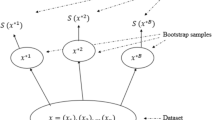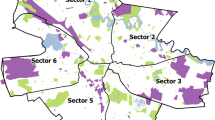
Overview
- Open access book providing a comprehensive overview of income inequality and socio-economic segregation in large cities
- Offers a systematic comparison of changes in income inequality and socio-economic segregation on a global level
- Focuses on occupational and socio-economic segregation
- Includes supplementary material: sn.pub/extras
Part of the book series: The Urban Book Series (UBS)
Buy print copy
Tax calculation will be finalised at checkout
About this book
This open access book investigates the link between income inequality and socio-economic residential segregation in 24 large urban regions in Africa, Asia, Australia, Europe, North America, and South America. It offers a unique global overview of segregation trends based on case studies by local author teams. The book shows important global trends in segregation, and proposes a Global Segregation Thesis.
Rising inequalities lead to rising levels of socio-economic segregation almost everywhere in the world. Levels of inequality and segregation are higher in cities in lower income countries, but the growth in inequality and segregation is faster in cities in high-income countries. This is causing convergence of segregation trends. Professionalisation of the workforce is leading to changing residential patterns. High-income workers are moving to city centres or to attractive coastal areas and gated communities, while poverty is increasingly suburbanising. As a result,the urban geography of inequality changes faster and is more pronounced than changes in segregation levels. Rising levels of inequality and segregation pose huge challenges for the future social sustainability of cities, as cities are no longer places of opportunities for all.
Similar content being viewed by others
Keywords
Table of contents (27 chapters)
-
Front Matter
-
Asia
-
Front Matter
-
Editors and Affiliations
About the editors
Tiit Tammaru is Professor of Urban and Population Geography and Head of the Chair of Human Geography at the Department of Geography, University of Tartu. He is the member of the Estonian Academy of Sciences. Tammaru leads the development of longitudinal linked censuses and registers data for urban and population geographic studies in Estonia. He was trained in human geography and received a doctoral degree from the University of Tartu in 2001. In 2018 he was a Visiting Professor at the Neighbourhood Change and Housing research group at the Department OTB – Research for the Built Environment, Faculty of Architecture and the Built Environment, Delft University of Technology. He has also worked a guest researcher at the Department of Geography, University of Utah, and Department of Geography, Umeå University. He is the Editorial Board member of Social Inclusion. Tammaru is theorizing the paradigmatic shift in segregation studies from residential neighborhood approach to activity space-based approach. Together with colleagues from Delft and Tartu he is developing the concept of vicious circle of segregation that focusses on how social and ethnic inequality and segregation are produced and reproduced across multiple life domains: homes, workplaces, schools, leisure time activity sites.
Rūta Ubarevičienė is a researcher with a background in urban and regional geography as well as sociology. Rūta has successfully defended two PhD thesis in these fields. In 2017 she obtained PhD degree from Delft University of Technology, and in 2018 from Lithuanian Social Research Centre. Currently Rūta is a postdoctoral researcher in the Urban Studies research group at the Department of Urbanism, Delft University of Technology and in the Institute of Human Geography and Demography at the Lithuanian Social Research Centre. Using spatial analysis and statistical techniques, she analyses global and local spatial processes of the social and economic systems. Her research interests include socio-spatial inequalities, social segregation, depopulation, internal migration, and post-socialist change.
Heleen Janssen is an Assistant Professor in the Urban Studies research group at the Department of Urbanism of Delft University of Technology. She is a social scientist with a background in Sociology and Criminology and received her doctoral degree from Utrecht University in 2016. Her main research interests include urban sociology, crime and delinquency, spatial inequality, segregation, ethnic diversity, social cohesion and neighborhood effects. Heleen is affiliated to the independent research group Space, Contexts, and Crime at the Max Planck Institute for the Study of Crime, Security and Law (Freiburg, Germany). Heleen has previously worked atthe Max Planck Institute for Foreign and International Criminal Law (Freiburg, Germany) and the Netherlands Institute for the Study of Crime and Law Enforcement (NSCR; Amsterdam, the Netherlands).
Bibliographic Information
Book Title: Urban Socio-Economic Segregation and Income Inequality
Book Subtitle: A Global Perspective
Editors: Maarten van Ham, Tiit Tammaru, Rūta Ubarevičienė, Heleen Janssen
Series Title: The Urban Book Series
DOI: https://doi.org/10.1007/978-3-030-64569-4
Publisher: Springer Cham
eBook Packages: History, History (R0)
Copyright Information: The Editor(s) (if applicable) and The Author(s) 2021
Hardcover ISBN: 978-3-030-64568-7Published: 30 March 2021
Softcover ISBN: 978-3-030-64571-7Published: 12 May 2022
eBook ISBN: 978-3-030-64569-4Published: 29 March 2021
Series ISSN: 2365-757X
Series E-ISSN: 2365-7588
Edition Number: 1
Number of Pages: XVI, 523
Number of Illustrations: 29 b/w illustrations, 151 illustrations in colour
Topics: Urban Geography / Urbanism (inc. megacities, cities, towns), Social Structure, Social Inequality, Economic Geography, Organizational Studies, Economic Sociology, Human Geography, Demography



